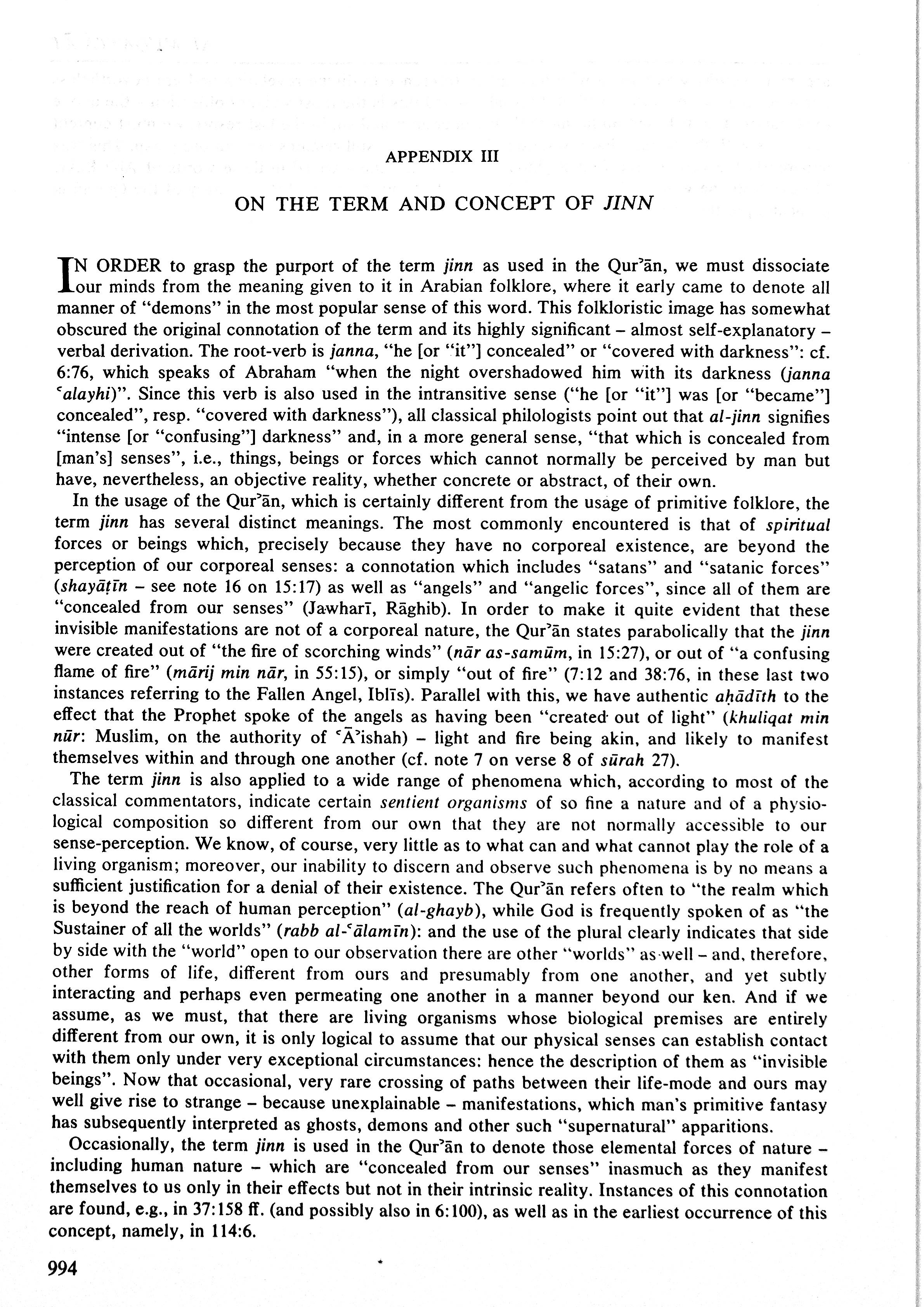Muhammad Asad, The Message of the Qur’ān; Translated and Explained by Muhammad Asad (1980)
Appendix III
On the Term and Concept of Jinn
In order to grasp the purport of the term jinn as used in the Qurʾān, we must dissociate our minds from the meaning given to it in Arabian folklore, where it early came to denote all manner of “demons” in the most popular sense of this word. This folkloristic image has somewhat obscured the original connotation of the term and its highly significant – almost self-explanatory – verbal derivation. The root-verb is janna, “he [or “it”] concealed” or “covered with darkness”: cf. 6:76, which speaks of Abraham “when the night overshadowed him with its darkness (janna ʿalayhi)”. Since this verb is also used in the intransitive sense (“he [or “it”] was [or “became”] concealed”, resp. “covered with darkness”), all classical philologists point out that al-jinn signifies “intense [or “confusing”] darkness” and, in a more general sense, “that which is concealed from [man’s] senses”, i.e., things, beings or forces which cannot normally be perceived by man but have, nevertheless, an objective reality, whether concrete or abstract, of their own.
In the usage of the Qurʾān, which is certainly different from the usage of primitive folklore, the term jinn has several distinct meanings. The most commonly encountered is that of spiritual forces or beings which, precisely because they have no corporeal existence, are beyond the perception of our corporeal senses: a connotation which includes “satans” and “satanic forces” (shayaṭīn – see note 16 on 15:17) as well as “angels” and “angelic forces”, since all of them are “concealed from our senses” (Jawharī, Rāghib). In order to make it quite evident that these invisible manifestations are not of a corporeal nature, the Qurʾān states parabolically that the jinn were created out of “the fire of scorching winds” (nār as-samūm, in 15:27), or out of “a confusing flame of fire” (mārij min nār, in 55:15), or simply “out of fire” (7:12 and 38:76, in these last two instances referring to the Fallen Angel, Iblīs). Parallel with this, we have authentic aḥādīth to the effect that the Prophet spoke of the angels as having been “created- out of light” (khuliqat min nūr: Muslim, on the authority of ʿĀʾishah) – light and fire being akin, and likely to manifest themselves within and through one another (cf. note 7 on verse 8 of sūrah 27).
The term jinn is also applied to a wide range of phenomena which, according to most of the classical commentators, indicate certain sentient organisms of so fine a nature and of a physiological composition so different from our own that they are not normally accessible to our sense-perception. We know, of course, very little as to what can and what cannot play the role of a living organism; moreover, our inability to discern and observe such phenomena is by no means a sufficient justification for a denial of their existence. The Qurʾān refers often to “the realm which is beyond the reach of human perception” (al-ghayb), while God is frequently spoken of as “the Sustainer of all the worlds” (rabb al-ʿālamīn): and the use of the plural clearly indicates that side by side with the “world” open to our observation there are other “worlds” as well – and, therefore, other forms of life, different from ours and presumably from one another, and yet subtly- interacting and perhaps even permeating one another in a manner beyond our ken. And if we assume, as we must, that there are living organisms whose biological premises are entirely different from our own, it is only logical to assume that our physical senses can establish contact with them only under very exceptional circumstances: hence the description of them as “invisible beings”. Now that occasional, very rare crossing of paths between their life-mode and ours may well give rise to strange – because unexplainable – manifestations, which man’s primitive fantasy has subsequently interpreted as ghosts, demons and other such “supernatural” apparitions.
Occasionally, the term jinn is used in the Qurʾān to denote those elemental forces of nature – including human nature – which are “concealed from our senses” inasmuch as they manifest themselves to us only in their effects but not in their intrinsic reality. Instances of this connotation are found, e.g., in 37:158 ff. (and possibly also in 6:100), as well as in the earliest occurrence of this concept, namely, in 114:6.
